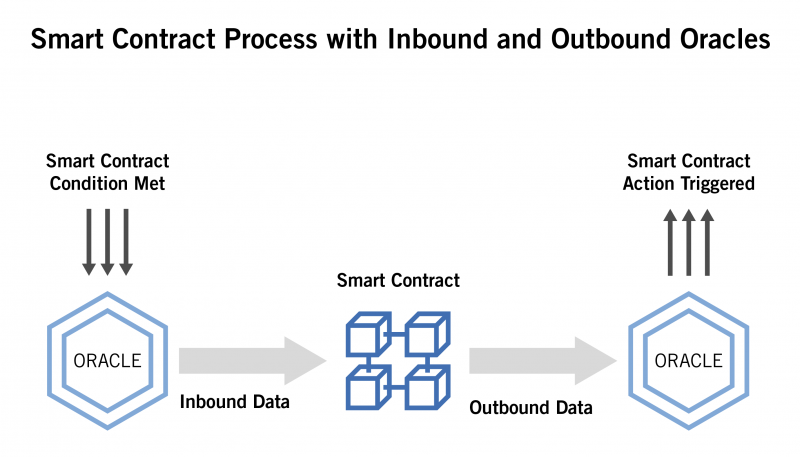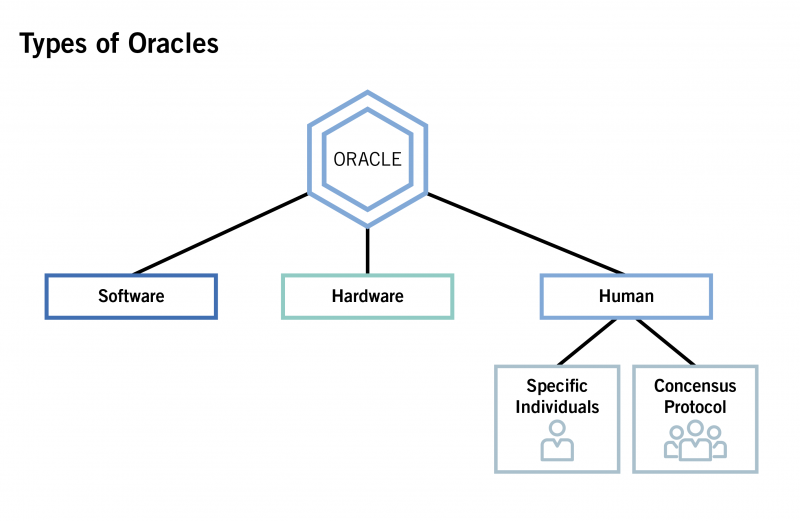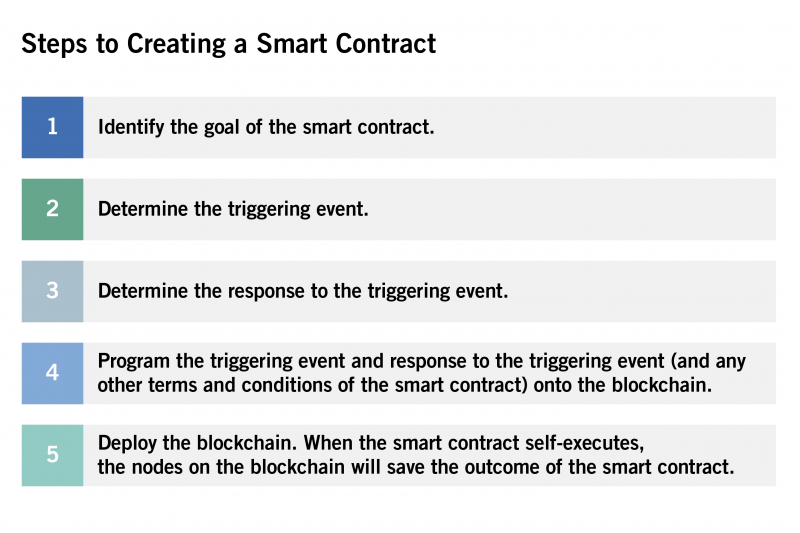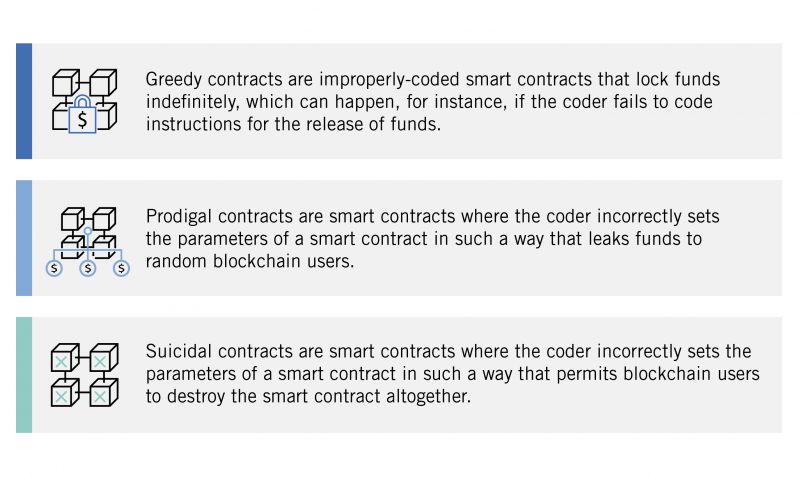What is a Smart Contract?
Although the term “smart contract” sounds like a legal instrument, a smart contract is actually a computer program that performs a task when triggered by the occurrence of a predetermined event. Smart contracts live on blockchain, which processes the terms of the smart contract, thereby enabling the smart contract to automatically execute the coded task when the triggering event occurs.
Nick Szabo, a computer scientist and cryptographer who coined the term “smart contract,” likens a smart contract to a vending machine.1 A consumer inserts money into a vending machine (i.e., satisfies the condition of the contract), and the vending machine automatically dispenses the treat (i.e., honors the terms of the “contract”).
Oracles
In order to trigger the automatic performance of a function, the smart contract uses “oracles” to receive information from the outside world.
Inbound vs. Outbound Oracles
An oracle can provide data from the outside world for consumption by the smart contract living on the blockchain (an “inbound oracle”) or allow smart contracts to send data to the outside world (an “outbound oracle”). As an example of the latter, an IoT-enabled lock functions as an outbound oracle when the smart contract triggers the lock to unlock automatically if a party transacts a certain payment across the blockchain.

Types of Oracles
Types of oracles include hardware, software, and human:
-
Software Oracles. Software functions as an oracle by connecting smart contracts to online data sources, such as temperature, commodity prices, and transportation delays.
-
Hardware Oracles. Hardware oracles include pieces of equipment that communicate real-world information to the smart contract. RFID sensors, for instance, can detect environmental changes that link to blockchain to trigger a smart contract.
-
Human Oracles. Humans act as oracles when they provide real-world information to a smart contract, often with cryptography in place to ensure the proper individual provides the information. Another human-based approach to oracles uses a consensus protocol, meaning that different humans vote on the input to provide to the oracle. In any case, using a human oracle introduces the potential for human error. A party may nonetheless opt to use a human oracle when a decision requires subjectivity or when the nature of the triggering event makes continuous monitoring difficult.

In order to strengthen the trust of the oracle system, supply chain members can use a combination of oracle types for the same smart contract.
Examples of Smart Contracts for Supply Chain
In supply chain, smart contracts are particularly useful for releasing payment, recording ledger entries, and flagging a need for manual intervention.
-
Releasing Payment. A party could use a smart contract as a means to automatically release payment upon the satisfaction of a condition. For example, two parties, such as a manufacturer and a supplier, could set up digital wallets and a smart contract in order for the manufacturer to pay the supplier for the purchase of goods. After the manufacturer inspects and accepts the goods, the smart contract would automatically move cryptocurrency from the manufacturer’s digital wallet to the supplier’s digital wallet to effect payment.
-
Recording Ledger Entries. A party could write a smart contract to record to a blockchain ledger if some specified event occurs or does not occur. For example, if an IoT- enabled device detects the opening of a container during transit, a smart contract could automatically record this information. A party may find such monitoring particularly useful for goods that require a tight chain of custody, such as with the transport of pharmaceuticals.
-
Flagging a Need for Manual Intervention. Smart contracts are also useful for flagging the occurrence of an event that requires manual intervention. For example, for temperature-sensitive products, a smart contract tied to temperature monitors could alert all concerned parties if an out-of-range temperature occurs. This would allow the parties to promptly take action to correct the temperature, conduct an investigation into the reason for the out-of-range temperature and, when necessary, pull the affected products (and only the affected products) from the stream of commerce.

When is a Smart Contract a “Contract” from a Legal Perspective?
A smart contract may constitute a legal contract if the smart contract contains the elements of valid offer and acceptance, as well as adequate consideration. The general principles of contract law define an offer as a manifestation of willingness to enter into a bargain2 and acceptance as an agreement to that offer,3 while consideration denotes something of value exchanged by the contracting parties.4
In addition, for the smart contract to constitute a legally binding contract for the sale of goods, the contract must also satisfy the various requirements of Article 2 of the Uniform Commercial Code (UCC), including its statute of frauds requirements and its requirement that the contract set forth a quantity in order to be enforceable.5 Practitioners will need to evaluate on a case-by-case basis whether a smart contract meets these elements and therefore represents a binding legal contract for the sale of goods.
The Uniform Law Commission and the American Law Institute established a Uniform Commercial Code and Emerging Technologies Committee6 to study and evaluate the UCC in the context of “among other issues, distributed ledger technology, virtual currency, electronic notes and drafts, other digital assets, payments, and bundled transactions,” and the Uniform Law Commission released an issues memorandum7 discussing these topics in July 2021 following two years of committee meetings. While smart contracts have been part of the discussion, no formal evaluation for smart contracts has been performed by the Uniform Law Commission or the American Law Institute, leaving open the opportunity for clearer guardrails in the future as to whether a smart contract amounts to a legal contract.
Smart Contracts vs. Smart Legal Contracts
Smart contracts are not to be confused with smart legal contracts. While a smart contract is a computer program coded to effectuate an outcome upon the occurrence of a triggering event, a smart legal contract is “a legally binding agreement that is digital and able to connect its terms and the performance of its obligations to external sources of data and software systems.”8 The Accord Project makes clear that, although a smart legal contract can use smart contracts via blockchain technology, a smart legal contract can also be created using traditional software systems without the use of blockchain.9

Vulnerabilities
While properly coded smart contracts could dramatically increase efficiencies in supply chains, companies face a risk that their smart contracts contain bugs or other technical issues such as data block corruption. There are three common types of vulnerabilities that arise from improperly coded smart contracts: greedy contracts, prodigal contracts, and suicidal contracts.10

In addition, another complicating factor for using smart contracts is the inability of a non-coder to read whether the smart contract actually does what he or she wants it to do. Even though the parties may have a traditional text-based agreement in place that provides the parameters for the smart contract, the programmer could code the smart contract in a way that is not consistent with the written agreement. If the businessperson were unable to read code, he or she would have no way to verify whether the coded smart contract matches the text-based agreement.
Finally, because the immutable nature of blockchain also extends to smart contracts (which live on a blockchain), once a programmer codes and deploys a smart contract, immutability prohibits the addition of any new functions to the smart contract. Upgrading and otherwise altering smart contracts is an active area of research in the blockchain community, and mechanisms for altering smart contracts and best practices are still being developed.
While smart contracts could increase efficiency in the supply chain, real risks exist that the coder could set the smart contract up improperly or that the smart contract fails to account for a change in circumstances. Businesses seeking to employ smart contracts will need to weigh the pros and cons carefully and allocate the risks between the participants in the smart contract accordingly.
FOOTNOTES
1 Levi, Stuart D. and Alex B. Lipton, An Introduction to Smart Contracts and Their Potential and Inherent Limitations, Harvard Law School Forum on Corporate Governance,
2 See RESTATEMENT (SECOND) OF CONTRACTS § 24 (AM. LAW INST. 1979)
3 See RESTATEMENT (SECOND) OF CONTRACTS § 22-23 (AM. LAW INST. 1979)
4 See RESTATEMENT (SECOND) OF CONTRACTS § 71 (AM. LAW INST. 1979)
5 See Uniform Commercial Code § 2-201(1)
6 Uniform Commercial Code and Emerging Technologies Committee, Uniform Law Commission, (last retrieved September 7, 2021)
7 Uniform Commercial Code and Emerging Technologies, Uniform Law Commission (July 9-15, 2021)
8 Frequently Asked Questions, the Accord Project (last retrieved August 22, 2021)
9 Id.
10 Groschopf, Wolfram et al., Smart Contracts for Sustainable Supply Chain Management: Conceptual Frameworks for Supply Chain Maturity Evaluation and Smart Contract Sustainability Assessment, Frontiers in Blockchain (April 9, 2021)





 />i
/>i

